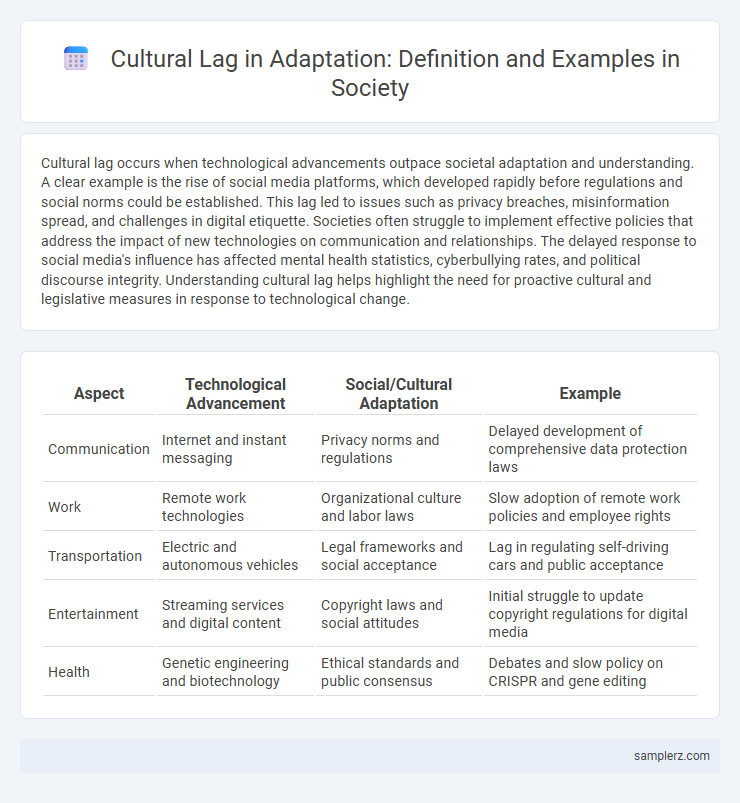Cultural lag occurs when technological advancements outpace societal adaptation and understanding. A clear example is the rise of social media platforms, which developed rapidly before regulations and social norms could be established. This lag led to issues such as privacy breaches, misinformation spread, and challenges in digital etiquette. Societies often struggle to implement effective policies that address the impact of new technologies on communication and relationships. The delayed response to social media's influence has affected mental health statistics, cyberbullying rates, and political discourse integrity. Understanding cultural lag helps highlight the need for proactive cultural and legislative measures in response to technological change.
Table of Comparison
| Aspect | Technological Advancement | Social/Cultural Adaptation | Example |
|---|---|---|---|
| Communication | Internet and instant messaging | Privacy norms and regulations | Delayed development of comprehensive data protection laws |
| Work | Remote work technologies | Organizational culture and labor laws | Slow adoption of remote work policies and employee rights |
| Transportation | Electric and autonomous vehicles | Legal frameworks and social acceptance | Lag in regulating self-driving cars and public acceptance |
| Entertainment | Streaming services and digital content | Copyright laws and social attitudes | Initial struggle to update copyright regulations for digital media |
| Health | Genetic engineering and biotechnology | Ethical standards and public consensus | Debates and slow policy on CRISPR and gene editing |
Understanding Cultural Lag: A Social Perspective
Technological advancements like smartphones often outpace societal norms and legal regulations, illustrating cultural lag in adaptation. Social institutions struggle to address issues such as privacy and digital etiquette, causing a delay in aligning cultural values with new technologies. This lag highlights the challenges in integrating innovations within existing social frameworks effectively.
The Impact of Technology on Social Norms
The rise of social media platforms has rapidly transformed communication practices, yet many social norms around privacy and face-to-face interactions lag behind technological advances. Online behaviors, such as sharing personal information, often outpace legal and ethical frameworks, creating conflicts between digital expression and societal expectations. This disconnect illustrates cultural lag as communities struggle to adjust social conventions to new technology-driven realities.
Traditional Education vs. Digital Learning Platforms
Traditional education systems often struggle to integrate rapidly evolving digital learning platforms, creating a cultural lag where outdated teaching methods persist despite technological advancements. This lag hampers students' ability to develop digital literacy skills essential for modern careers and global communication. Embracing adaptive curriculum design and teacher training programs can bridge the gap between conventional pedagogy and innovative digital tools.
Gender Roles and Delayed Social Change
In many societies, traditional gender roles persist despite advances in gender equality, illustrating cultural lag where social norms adapt slower than technological or legal changes. For example, women continue to face disproportionate expectations in domestic responsibilities even as they achieve higher educational and professional status. This delay in shifting gender role perceptions slows broader gender equality and social change.
Urbanization and Its Effects on Family Structures
Rapid urbanization often outpaces the development of social norms and support systems, leading to cultural lag in family structures. Traditional extended family networks weaken as urban living promotes nuclear family arrangements, affecting caregiving and socialization roles. This mismatch between urban lifestyle demands and existing family practices results in challenges such as decreased intergenerational support and increased social isolation.
Attitudes Toward Mental Health in a Modern Society
Attitudes toward mental health often lag behind advancements in medical understanding and treatment options, resulting in persistent stigma and discrimination despite increased awareness. Cultural norms and traditional beliefs continue to influence perceptions, limiting acceptance and support for mental health issues in many communities. This gap hinders effective utilization of modern mental health resources and delays societal progress in addressing mental health challenges comprehensively.
Social Media Influence vs. Privacy Norms
Social media platforms rapidly evolve, introducing features that prioritize user engagement while outpacing existing privacy regulations and societal norms. This discrepancy creates cultural lag, where users and legal frameworks struggle to adapt to the intensified exposure and data sharing inherent in platforms like Facebook, Instagram, and TikTok. The persistent tension between innovative digital communication and traditional privacy expectations exemplifies the ongoing adjustment challenges within modern social structures.
Aging Populations and Evolving Care Practices
Aging populations present a clear example of cultural lag as healthcare systems often struggle to adapt quickly to the rising demand for elder care and innovative support models. Despite increased life expectancy, social norms and policies lag behind, resulting in inadequate provisions for mental health, long-term care, and technological integration. This delay in adapting care practices intensifies challenges for families and governments trying to meet the complex needs of older adults.
Environmental Awareness and Everyday Behaviors
Environmental awareness has surged due to scientific research and media coverage, yet everyday behaviors like excessive plastic use and energy waste persist. This cultural lag occurs because social norms, infrastructure, and convenience often inhibit rapid adoption of eco-friendly practices. Overcoming this gap requires systemic changes and sustained behavioral shifts to align attitudes with sustainable actions.
Immigration Trends and Cultural Integration Challenges
Immigration trends often reveal cultural lag as new communities struggle to adapt to prevailing social norms while retaining their traditional values. Language barriers, differing social customs, and economic integration difficulties highlight the slow pace at which institutional structures accommodate diverse cultural backgrounds. This lag creates challenges in achieving seamless cultural integration and social cohesion.

example of cultural lag in adaptation Infographic
 samplerz.com
samplerz.com